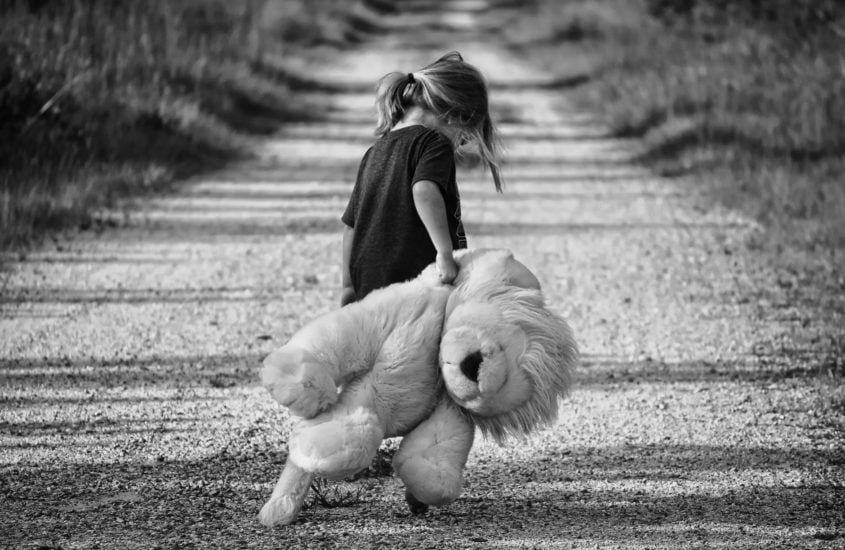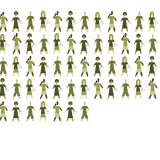Loving the Broken Again and Again and Again (Loving Someone with Adverse Childhood Experiences)

I recently finished a book I heard about and was afraid to read—but I read anyway. That was a small brave decision on my part because I knew it would touch some of my pain spots. The book is Leaving Cloud 9: The True Story of a Life Resurrected from the Ashes of Poverty, Trauma, and Mental Illness by Ericka Anderson. It is a biography with a happy ending but I feared the pain of the story because it is the pain I live with every day. My happy ending is still a long ways off. Did I really need to read the pain that I know?
The story is the wife’s perspective on how her husband has overcome Adverse Childhood Experiences (ACE). I never heard of this classification before but it makes sense to me. ACE is a real syndrome. It is recognizing how early traumas do impact the overall development of that person.
This story also has a beautiful middle part of Jesus redeeming what was taken away from this man’s younger years. There is the beautiful Jesus part and then the hard work part to cling to the truth no matter what your brain is telling you. Particularly the brain that was shaped by those adverse childhood experiences.
I love a son who’s brain sometimes lies to him about who he is and it stems from his adverse childhood experiences.
I’ve got good news for you (and for me). You have been given authority over your brain. God-given authority. We don’t need to repeat our generational sins. We are a new creation and we will overcome.
Maybe this story from the book tops all of the ones our son hasn’t told us yet. We know there are lots of stories he has yet to put words on.
On some of these nights, after the man left, Sylvia would become inconsolable—drinking, sobbing, calling for her kids to come be with her, turning on sad music, and wailing into the night. Rick usually just waited for her to pass out on the kitchen floor. Only then wuld they find some relief from the drunken hysteria. Her passing out meant the night could end and they could finally sleep with a bit of peace, knowing she’d be out for several hours.
But even then, Rick’s job wasn’t over.
The trailer was often flooded with roaches. He learned quickly that if he left his mom alone on the floor, the roaches would overtake her unmoving body. So instead of going to bed on those nights, he and Jenny would sit watch in the kitchen and pick off the roaches before they reached her face, her arms, her ears, and the rest of her body.
Sylvia never knew. -–Ericka Anderson, Leaving Cloud 9: The True Story of a Life Resurrected from the Ashes of Poverty, Trauma, and Mental Illness, p. 83-84
I have chosen to love my son. Unconditionally. Even as he rejects what that is. Especially as he has no idea how to love us back—and hurts us so often. I understand this:
It was night like that one that created in Rick the hair-trigger defensiveness that defines post-traumatic stress. This is a common reaction in children who grow up in frightening, uncertain conditions. When childhood eventually ends and they are safe from the predators of the past, they still feel like they’re in the jungle, with threats lurking everywhere. They live on high alert, and it’s easy for them to forget they are grownups who can fend for themselves and live in a more rational world. –Ericka Anderson, Leaving Cloud 9: The True Story of a Life Resurrected from the Ashes of Poverty, Trauma, and Mental Illness, p. 47
So often another’s words really knows how to describe how you feel but you can’t put your own words around it. I’m living those words.
Now that a new syndrome has been named nothing really changes. Those of us who love such broken people are still in these love relationships to the end. This is why this quote has become my life quote.
“The brokenhearted are indeed the bravest among us—they dared to love, and they dared to forgive.” –Dr. Brene Brown
While this sounds beautiful and brave, make no mistake this is also a boundaried life. Forgiveness requires putting boundaries on people, especially our broken beloveds.
This is the brave work that this life requires. You can’t have bravery without vulnerability (research says so) and vulnerability means having the guts to show up when there is no guaranteed outcome. And we know about that, don’t we?!!!!
I was talking to another mom who’s adopted daughter ran away and left the relationship with lots of hurtful words. Not only are her whereabouts causing anxiety and her absence causing sadness, those hurtful words are still felt. I said to her something like this,
“You and I know the painful truth. So many others see our stories–of how we have bravely loved and raised broken children–and think we are so admirable…so brave. But the reality is we never feel secure in what we are doing as we press in anyway…every time. Few give us space for our insecurity because we’ve chosen to love so bravely.”
So to you who have loved so bravely—and are so full of insecurity—bravo! Maybe my words will bless you today as you are bravely loving through it all.
You are seen. The crumbling parts inside of you as well as the gutty part of you that knows you are in this relationship all the way to the end.
And somehow through it all, you know a true beauty. You are a true beauty.
p.s. For more information on ACE, check out this little quiz.
When you take it guessing your son’s answers knowing full well you don’t know every story from before the time he came to be with you and your score is an 8 out of 10, you just know don’t you?!
(photo credit: Pixabay.com)






